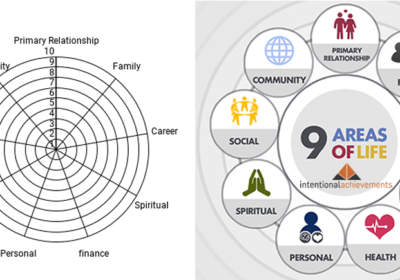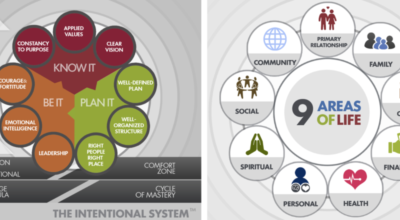Being intentional involves having a clear purpose and making deliberate choices towards achieving that purpose which are in alignment with your Vision, Values, and Passions. It requires setting goals and taking action towards those goals, rather than just going through the motions or reacting to external circumstances.
Systems thinking is a way of looking at the world and trying to understand how things are connected to each other. Imagine you have a bunch of puzzle pieces and you’re trying to put them together to make a picture. Systems thinking is like looking at all the pieces and figuring out how they fit together to make the big picture.
For example, let’s say you want to understand why there’s a lot of pollution in a river. Systems thinking would help you look at all the different parts of the problem, like the factories that are putting pollution into the water, the way people use the river for activities like fishing and swimming, and the types of plants and animals that live in the river. By looking at all these pieces and how they fit together, you can get a better understanding of what’s causing the problem and what can be done to fix it. This kind of thinking can help you understand complex problems and find better solutions. Instead of just focusing on one part of a problem, like a single factory, you can see how many different things are contributing to the issue and find a solution that takes all those things into account.
Closer to us personally, applying a systems thinking approach to one’s health means looking at health as a complex and interconnected system, rather than focusing on individual health issues or symptoms in isolation. For example, if someone has a headache, they might normally take a painkiller to relieve the pain. But using a systems thinking approach, they would look at all the different parts of their health that might be contributing to the headache, such as stress levels, sleep patterns, diet, and physical activity. By considering all these factors and how they are connected, they can get a more comprehensive understanding of the problem and find solutions that address the root cause, rather than just treating symptoms.
This approach can help individuals understand the importance of taking a holistic approach to their health, by considering how different aspects of their life, such as work, relationships, and emotional well-being, can impact their physical health. For instance, someone who is under a lot of stress at work might use systems thinking to understand how that stress is affecting their sleep, diet, and overall health. By taking a comprehensive and proactive approach, they can find ways to manage their stress and maintain a healthy balance in their life.
Just as with a person’s health, applying a systems thinking approach to one’s life means looking at all the different parts of our life as interconnected and interdependent. By doing so, individuals can understand how different aspects of their life, such as work, relationships, health, finances, and leisure activities, impact each other, and find solutions that create a more harmony and balance.
In this way, systems thinking can be a useful tool for personal growth and self-improvement. By taking a holistic and proactive approach to our life, individuals can identify areas where we may be out of balance and make changes that create a more fulfilling and satisfying life.
When combined, systems thinking and being intentional can help individuals and organizations make more informed decisions and create positive change in complex situations. By approaching them with a clear purpose and considering the wider implications of our actions, we can ensure our efforts are having the desired impact and contributing to sustainable, long-term solutions.
In conclusion, by using both systems thinking and being intentional, you can take a holistic and proactive approach to you personal life, helping you achieve balance and fulfillment in all aspects of your life.




